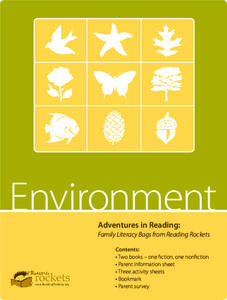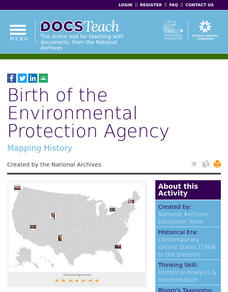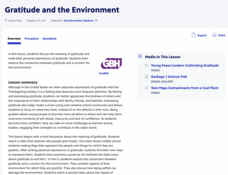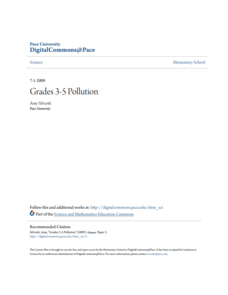British Council
Sports in (Climate) Crisis
Can sports affect the climate? Scholars read an article about the effects sports have on the enivronment. They then complete a problem tree sheet to brainstorm solutions for the issue.
PBS
Reading Adventure Pack: Environment
A fiction and nonfiction text, The Great Kapok Tree: A Tale of the Amazon Rain Forest by Lynne Cherry and I See a Kookaburra! Discovering Animal Habitats Around the World by Steve Jenkins and Robin Page begins a learning experience in...
EngageNY
Research Skills, Part 2: Natural Resource Development and How It Modifies the Physical Environment
Name your source. Scholars receive research folders with articles of information about natural resources. They use the sources to conduct research to answer questions about how Canada's environment meets the needs of the people and how...
EngageNY
End of Unit Assessment, Part 1: Research and Response
Stay on target. The class reviews the learning targets for the unit and the end of unit assessment. Scholars then begin working on part one of the assessment answering how Canada's natural resources meet the needs of the people and how...
DocsTeach
Birth of the Environmental Protection Agency
Seeing is believing when it comes to climate change. An informative activity explores the creation of the Environmental Protection Agency (EPA) and its efforts to document environmental issues with photographs. Academics match images...
PBS
Gratitude and the Environment
A class discussion begins a two-part lesson about gratitude and the environment. In part one, learners watch a video then share their feelings about its most memorable moment. Delving deep into the meaning of gratitude, scholars create...
Teach Engineering
Investigating the Properties of Plastic and its Effects on the Environment
Pore over the properties of plastic. Working through four different stations, pupils investigate some properties of plastic, including chemical decomposition, mechanical breakdown, density, and the ability to infiltrate the food chain....
American Museum of Natural History
Ask a Scientist About Our Environment
Let's ask an expert! Scientists at the American Museum of Natural History field questions about the environment in an interactive resource. Question topics range from global warming and conservation to endangered species and habitats.
Just Health Action
Environmental Justice Matters: Mapping Environmental Justice Impacts (Part 1)
A case study of Seattle, Washington permits class members to compare and rank how different areas of Seattle are impacted by environment burdens. Groups investigate different zip codes, collect data on five categories, and color-code a...
University of Waikato
Farming and Environmental Issues
Forming ethical arguments is sometimes a complicated task. Guide classes through a process for forming and presenting ethical opinions. Learners consider the views of all stakeholders on the impact of farming on the environment and the...
American Museum of Natural History
Ask a Scientist About Our Environment
Scientists respond to 26 question posed by learners. These experts answer in easy to understand language, include photos to illustrate the issue, offer suggestions for how young people can make a difference, and supply links to resources...
National Wildlife Federation
Habitat for Sale
Where would this animal like to live? Pupils choose an animal and write an ad to advertise that animal's habitat or home. For a little fun, learners create the newspaper ads to provide enough detail for classmates to...
A Mighty Girl
Juliana Rotich
Hahidi, which is testimony or witness in Swahili, is a concept, a program, a community of people. This free and open-source software was developed by Juliana Rotich. A poster celebrates her vision and accomplishments and deserves an...
Purdue University
Food Waste and the Environment
Out of sight out of mind can be a dangerous habit. Learners investigate the life of food waste after it leaves people's homes and its impact on the environment. They complete a series of three activities that involve building a mini...
Purdue University
Explore Your Habitat
Get a hands-on look at a local habitat. A three-part activity begins with a discussion of the characteristics of a local habitat. Pupils then test their knowledge by playing a game to match animals to their habitats. Finally, they go on...
Pace University
Grades 6-8 Ecology
Why are our national parks important? Scholars research the national parks and explore the basic ecology of these areas in a differentiated instruction unit on ecology. They learn about ecosystems, food chains, symbiosis, and biomes. The...
Pace University
Pollution
Over the course of 10 days, scholars take a pre-assessment to place them in one of three leveled groups. Whole-class and in small groups, pupils take part in read-alouds, field trips, hands-on activities, and complete learning contracts...
Advocates for Human Rights
The Right to a Clean Environment: Right to a Clean Environment Role-Play
A lesson challenges scholars to think critically about the world in which they live. Learners begin by role-playing a character, answering questions, and taking part in a whole-class discussion. They then brainstorm ways they can help...
Arbor Day Foundation
Trees are Terrific...Inside and Out!
Trees are the star of a three-step unit celebrating Arbor Day. Step one takes an in-depth look into the structure of a tree, the process of photosynthesis, and the benefits of the leafy giants. Step two challenges scholars to create a...
Arbor Day Foundation
Trees: A Joy Forever
This Arbor Day, put on a show! A three-scene play follows a boy and girl that run into Arbor Day founder, J. Sterling Morton. Morton describes how the holiday came to be and discovers how his hard work has grown into a national...
Serendip
Evolution of Fur Color in Mice – Mutation, Environment and Natural Selection
Most species of animals include a variety of fur or hair color, but why? Scholars watch a video about a changing environment for mice. As the rocks around them change hues, different colors of mice begin to thrive. Discussion questions...
WE Charity
High School–Module 2: Circular Economy and Nature
Everyone's heard the popular slogan reduce, reuse, recycle, but there may be a better way to talk about sustainability. Using the second lesson from the five-part WE Are Innovators—High School Modules series, learners explore issues...
WE Charity
High School–Module 1: Sustainable Innovation
What does it mean to have an innovative mindset? Pupils think outside the box with the first of five lessons from the WE Are Innovators—High School Modules set. Scholars read articles and watch videos about sustainable innovation, such...
WE Charity
High School–Module 5: Transportation Solutions
Planes, trains, and automobiles ... the abundance of today's transportation options comes at a hefty price. Using the fifth and final lesson plan from the WE Are Innovators—High School Modules set, pupils explore how modern...

























